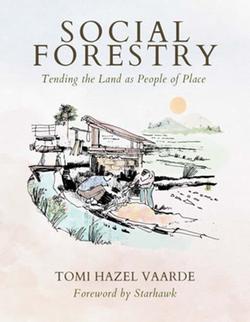Summary
Text courtesy of Synergetic Press
Social Forestry: Tending the Land as People of Place is a must-have for anyone who wants a reciprocating relationship with their communities, themselves, and most importantly their awe-inspiring forests and landscapes.
Social Forestry connects villages and communities to their land and adjoining bodies of water. Concepts include forest management, protection, and regeneration of deforested lands with the objective of improving the rural, environmental, and social development. Through ecological assessment, carbon sequestration, and generating wildcrafts, people re-establish their wonder in the woods.
Author Tomi Hazel Vaarde, collaborator of Siskiyou Permaculture, uses poetry, photographs, drawings, and data to outline philosophies and concepts of Social Forestry. By weaving culturally sensitive stories, myths, and lessons from a range of customs and traditions including North American Indigenous communities and Vaarde’s own Quaker upbringing, Vaarde explores how holistic land and community management approaches can facilitate resolution of some of our most dire local and global crises. The writer’s work is critical to overcoming eco-grief while instilling necessary changes to the West Coast landscape for fire mitigation and restoration of complex forest systems for generations to come.
Many Indigenous peoples have learned regenerative management by living for generations in and with a sense of place, but few examples of whole-system planning and participation are evident in modern society. Climate adaptation, human survival, and the maintenance of biodiversity that supports life on Earth require radical, back-to-the-roots grounding and intentional dedication. Social Forestry helps readers remember the ways of the wild while implementing local food production, collaboration with conservation efforts, forest management, and stabilization of headwaters to build resilience for the long term. To live in harmony with our surroundings, we need to re-skill, always remembering those who came before us and acting in ways that honor traditional wisdom of people and place.
Reviews:
Inside this luminous guide, you will find practical placemaking advice, ancient lore, and a humor that shimmers. Receive these generous offerings—a lifetime of wisdom from an elder, a teacher of permaculture, and radical changemaker like no other—and you will be transformed. Together we listen to the earth, we understand where we belong, and we find our way home again.
—Helena Norberg-Hodge, Director of Local Futures and author of Ancient Futures: Learning from Ladakh
Social Forestry by Tomi Hazel Vaarde is a book of hope. Hazel shows how our relationship with the Earth and her forests does not have to be an extractive one leading to destruction. Through cooperating together we can regenerate our forests and rewild ourselves and the land, growing hope as ecosystems recover while empires crumble.
—Vandana Shiva, PhD, author of Agroecology and Regenerative Agriculture: Sustainable Solutions for Hunger, Poverty, and Climate Change
About the author:
Hazel is a long time resident of the Southern Oregon/Mount Shasta bioregion, first settling there in the early 1970’s. They are currently focused on Social Forestry, restoring Oak/Pine Savannah, fuel hazard management, wildcrafting, wildlife conservation, and desert forest water management.
They have been advising farms, stewarding forests, and teaching Environmental Sciences for more than fifty years.
After having earned degrees in Forestry and Systematic Botany from Syracuse University and SUNY College of Forestry in 1969, Hazel taught Wild Edible Plants and Woods-lore at Laney College in Oakland, California in the early 1970’s. After helping Bill Mollison teach the first Permaculture Design Course at Evergreen State College in 1982, they have been instrumental in teaching and spreading Permaculture practices ever since.
Hazel has taught dozens of Permaculture courses over the last 37 years, primarily in Southern Oregon and Northern California. These include the PDC, Permaculture Teachers Training, and advanced courses in Optical Surveying, Social Forestry, and Farm Planning. They were a frequent guest instructor for Toby Hemenway Permaculture design courses offered in the Northwest.
Published by Synergetic Press
456 pages
Where to get it?
Here on Permies with a special discount
Synergetic Press
Amazon.com
Amazon.co.uk

 8
8





 9
9




 2
2




 1
1





 2
2












